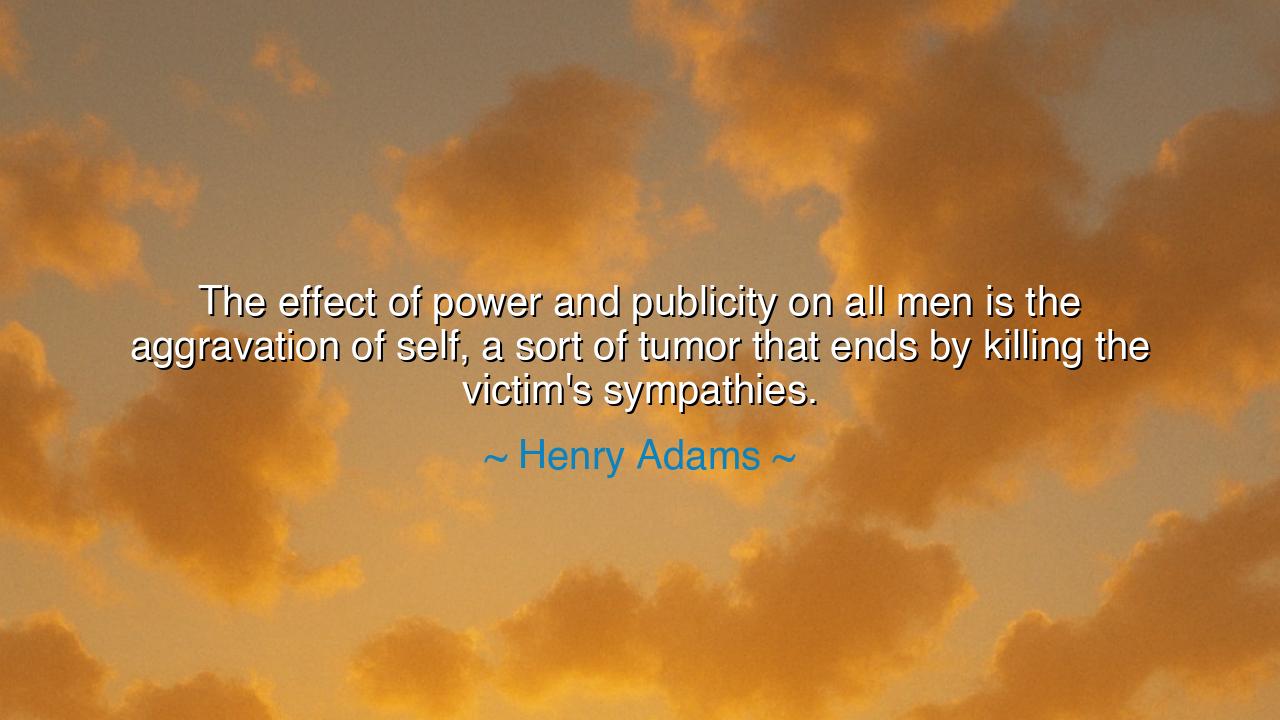
The effect of power and publicity on all men is the aggravation
The effect of power and publicity on all men is the aggravation of self, a sort of tumor that ends by killing the victim's sympathies.






Hear the solemn wisdom of Henry Adams, historian and descendant of statesmen, who declared: “The effect of power and publicity on all men is the aggravation of self, a sort of tumor that ends by killing the victim’s sympathies.” In these words he unveils a warning that echoes across the centuries: that greatness in the eyes of the world often leads to the shrinking of the heart. For when men are clothed in authority and bask in the glow of fame, they become swollen with the illusion of their own importance. What begins as confidence becomes pride, what begins as recognition becomes addiction, and soon, as Adams says, the tumor of the self grows until it chokes away compassion.
The meaning of this truth lies in the nature of power. To govern, to command, to be celebrated—these are intoxicating forces. At first, they seem to grant freedom and purpose. But over time, they bend the spirit inward, causing men to care less for others and more for their own image, their own survival, their own hunger for yet greater acclaim. Adams likens this to a tumor, for it is a growth unnatural, corrupting what should be healthy. The man of power may not see it happening, yet little by little, his sympathies—his ability to feel the pain and joy of others—begin to wither away.
History is filled with such tragic transformations. Consider the life of Napoleon Bonaparte, who rose as a champion of liberty, hailed as the savior of France. At first he inspired hope, embodying the dreams of a nation weary of tyranny. But as his fame spread and his publicity grew, so too did his self-regard. The flame of ambition swelled until it consumed his vision, driving him to conquest without end. His empire expanded, but his sympathies shrank; millions suffered in his wars. What began as genius ended in exile, the man who once liberated peoples now remembered as one consumed by his own tumor of self.
Adams himself, raised in the shadow of presidents, knew the allure of power. He witnessed how the mighty of Washington often grew deaf to the voices of ordinary men. In the halls of governance, he saw kindness sacrificed for expediency, ideals traded for recognition, and sympathy diminished by vanity. Thus his words are not the musings of theory, but the lament of experience. He saw firsthand how power, instead of ennobling, often deforms, and how the applause of the world can become a poison sweeter than honey but deadlier than venom.
The lesson here is stark and humbling: beware the flattery of publicity and the intoxication of power. They are not evil in themselves, but they are dangerous, for they test the human heart beyond its natural strength. To carry power without losing sympathy demands vigilance, humility, and a constant turning outward toward others. Few can bear such weight without corruption. For this reason, the ancients taught that the greatest leaders were those who least desired the throne, and the wisest rulers were those who remained servants at heart.
What then must we do? First, guard against the tumor of the self. If recognition comes, receive it with gratitude, but do not feed upon it. If power comes, wield it with trembling hands, remembering that its purpose is service, not self-glory. Surround yourself with truth-tellers, not flatterers, for they will remind you of your limits. And most of all, practice sympathy daily—listening to the lowly, helping the forgotten, honoring those who cannot advance your fame. These acts are the antidotes to the swelling of the self.
So let this teaching endure for the generations: power and publicity are double-edged swords. They can raise a man to greatness or drag him into ruin. If you would walk the path of wisdom, seek not recognition but righteousness, not applause but compassion. And should fortune place you in high station, remember always that the truest measure of your worth will not be the grandeur of your fame, but the tenderness of your sympathies. For when the self dies to pride, then life awakens to love.






AAdministratorAdministrator
Welcome, honored guests. Please leave a comment, we will respond soon